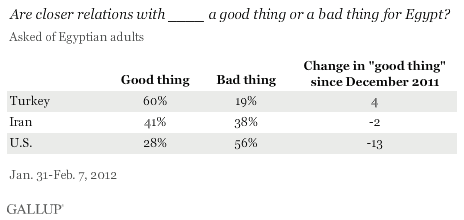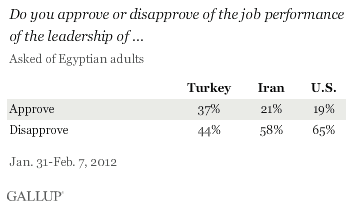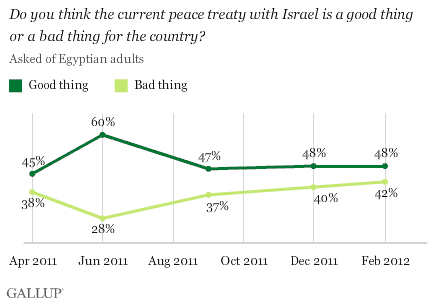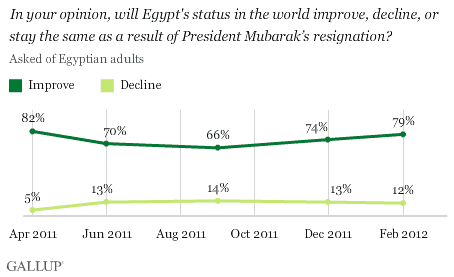LOS ANGELES -- The majority of Egyptians (56%) now see closer relations with the U.S. as a bad thing for their country, up sharply from 40% in December 2011. Slightly more than one-quarter (28%) say closer relations are a good thing, fewer than say the same thing about Turkey (60%) and Iran (41%).

The surge in Egyptian negativity documented by Gallup surveys coincides with a difficult period in U.S.-Egyptian relations. At about the same time as the Jan. 31-Feb. 7, 2012, survey, the Supreme Council of the Armed Forces closed a series of high-profile American and Egyptian non-governmental organizations (NGOs). In a recent opinion column, former Egyptian Ambassador to the U.S. Nabil Fahmy chastised the U.S. and Egyptian governments for their actions in the crisis. Fahmy pointed the finger at the U.S. for illegally operating NGOs after a 2005 agreement that called for licenses and at the Egyptian government for doing business with these same NGOs since 2005. Despite a temporary and controversial resolution, many analysts see this flare-up as the most recent source of tension in the U.S.-Egyptian relationship.
Egyptians are now more likely to see promise in closer ties with Turkey and Iran than with the U.S. A solid majority of Egyptians (60%) say closer relations with Turkey would be a good thing for Egypt, while 19% say it would be a bad thing. Forty-one percent of Egyptians say closer ties with Iran would be a good thing and 38% say they would be a bad thing.
As an emerging power player in Arab world affairs, Turkey is looking for ways to cooperate with the new Egypt. While Egyptians favor closer ties with Turkey, they do not necessarily approve of Turkey's leadership. The 37% of Egyptians who approve of the Turkey's leadership is up significantly from 15% in April 2011, but a sizable 44% disapprove.

While Egyptians greeted Turkish Prime Minister Recep Tayyip Erdogan like a "rock star," according to Time magazine, during his visit to Egypt last September, Egyptians were confused when Erdogan challenged the core Turkish credo that government is secular even if leaders run it in accordance with Sharia law.
Iran also seeks closer ties with Egypt. Although Egyptians are split, 41% to 38%, on the benefit of closer relations with Iran, a clear majority (58%) disapprove of its leadership. This is slightly lower than the nearly two-thirds (65%) who disapprove of the job performance of U.S. leadership.
Egyptians More Likely to See Value in Peace With Israel
The percentage of Egyptians who view their country's peace treaty with Israel as a good thing continues to exceed the percentage who say it is a bad thing. Nearly half of Egyptians (48%) surveyed in February said the Israel peace treaty is a good thing -- consistent with opinion through most of the post-Hosni Mubarak era.

It is interesting to note that Gallup finds supporters of Islamist parties are no more likely than others to oppose the peace treaty with Israel.
Egyptians See World Status Rising
As Egyptians continue to evaluate their ties with their regional and global partners, it is clear that they see their position in the world changing. Seventy-nine percent believe Egypt's world status will improve because of Mubarak's resignation, nearing the 82% just after the revolution. This means that although times are tough economically on the domestic front, Egyptians still expect their country's global standing to improve.

Implications
Egypt is a central player in the post-Arab Spring world, and regional and global decision makers in government, the private sector, and civil society are trying to determine what the country's role in the region will look like moving forward. Egyptians' clear disapproval of the leadership of the U.S. and Iran and favorable views of the peace treaty with Israel may confuse some in their search for answers. Despite current difficulties, Egyptians still overwhelmingly believe that Mubarak's ouster will improve the nation's status in the world. Support from other nations in bringing that belief to fruition is one approach to engaging Egypt's first elected post-revolution president and parliament.
For complete data sets or custom research from the more than 150 countries Gallup continually surveys, please contact SocialandEconomicAnalysis@gallup.com or call 202.715.3030.
Survey Methods
Results are based on face-to-face interviews with 1,000 adults, aged 15 and older, and conducted in Jan. 31-Feb 7, 2012, in Egypt. For results based on the total sample of national adults, one can say with 95% confidence that the maximum margin of sampling error is ±3.4 percentage points. The margin of error reflects the influence of data weighting. Earlier surveys are based on face-to-face interviews with approximately 1,000 adults, aged 15 and older, in Egypt. For results based on the total sample of national adults in these surveys, one can say with 95% confidence that the maximum margin of sampling error ranges from ±3.1 to ±3.5 percentage points.
In addition to sampling error, question wording and practical difficulties in conducting surveys can introduce error or bias into the findings of public opinion polls.
For more complete methodology and specific survey dates, please review Gallup's Country Data Set details.
